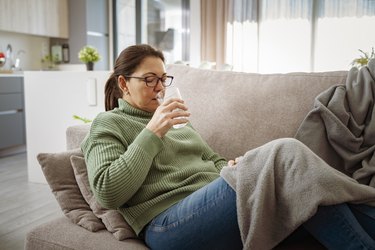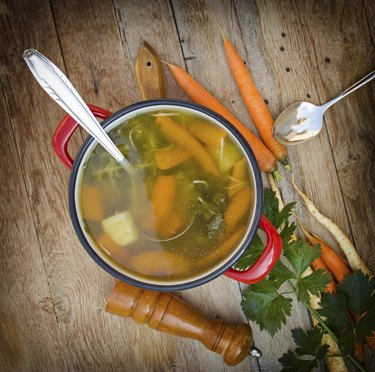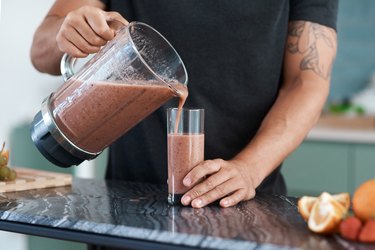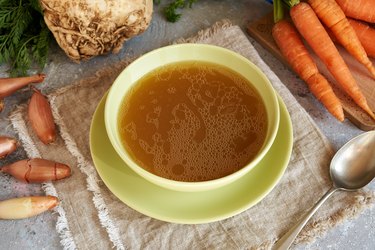
The preparation for a colonoscopy (often thought of as the most challenging aspect) begins a few days prior to your scheduled procedure. You'll receive clear instructions beforehand, most likely including details about what you can eat before a colonoscopy, as well as foods to avoid.
Along with dietary changes, bowel prep might involve laxatives in the form of pills or liquid drinks, enemas or a combo of these options, per the American Cancer Society (ACS). The goal with all this colonoscopy prep is to empty your colon so your physician has a clear view inside, per the Cleveland Clinic.
Video of the Day
Video of the Day
It's crucial to follow the preparation instructions precisely.
"If you don't complete colonoscopy prep, you risk food staying in your colon, which can obscure the views during the colonoscopy, meaning that the test is incomplete and has to be rescheduled," says Naila Arebi, MD, PhD, a consultant gastroenterologist at Princess Grace Hospital, part of HCA Healthcare UK.
Tip
To prepare your bowels, you will typically need to eat a low-fiber diet a few days before your colonoscopy, per the Cleveland Clinic. The day before the procedure, you'll follow a clear liquid diet, drinking clear broths and liquids and avoiding all solid foods.
Why Would You Need a Colonoscopy?
During a colonoscopy, a long, flexible, thin tube with a camera on the end is used to look at your large intestine or colon. The tube is inserted into your anus, and from there, advances into your rectum and colon, providing a view on a video monitor thanks to the camera, per the American Society for Gastrointestinal Endoscopy (ASGE).
There are a few reasons why you might need a colonoscopy, per the Mayo Clinic:
- Learn more about underlying causes of symptoms: If you're having rectal bleeding, chronic diarrhea or other symptoms, this procedure can help determine what's going on.
- Screen for cancer and check for polyps: A colonoscopy is used to screen for colon cancer. During the procedure, your doctor may find, remove and test polyps, which are growths on the inner lining of the colon and rectum, per the ACS. Follow-up colonoscopies may be recommended if polyps are found, according to the Mayo Clinic. The majority of polyps pose no harm, but some types are precancerous, per the Mayo Clinic.
- Treat issues: The procedure is also sometimes a treatment tactic, used to place stents or remove objects.
Why Dietary Restrictions Are Necessary Before a Colonoscopy
For a successful colonoscopy, doctors need a clear view. That means before the procedure, you'll need to empty the contents of your colon. This process begins a few days before your scheduled procedure and involves a few different steps.
How Soon Should You Make Dietary Changes?
Typically, your dietary adjustments will begin two or three days before the procedure, per the Cleveland Clinic.
The exact timing — along with the specific dietary adjustments you'll need to make — may vary. Make sure to review and follow the colonoscopy instructions you received, and check in with your doctor if you have any questions or are unclear about any steps.
What You Can Eat 2 Days Before a Colonoscopy and Foods to Avoid
A few days prior to your colonoscopy, you'll begin to follow a low-fiber diet, per the Cleveland Clinic.
"Recommended foods include those with little to no fiber," Dr. Arebi says. Foods to avoid during this stage include whole grains, nuts, seeds, dried fruit and raw veggies and fruit, according to Harvard Health Publishing.
But there are still plenty of foods you can enjoy as part of a pre-colonoscopy diet. "You should eat foods high in protein and carbohydrates as well, as these will help you feel fuller while you aren't able to consume fiber," Dr. Arebi says.
Foods to Eat
Some foods you can eat two days before a colonoscopy include the following, per Kaiser Permanente:
- Breads and grains made with refined white flour, like white bread, white pasta and white rice
- Meat, such as poultry, lean pork, beef and lamb
- Tofu
- Eggs
- Dairy products, including yogurt, cheese and sour cream
- Canned or cooked fruit
- Creamy peanut butter
- Soup or broth (strain cream-based soups)
- Canned or cooked vegetables without skin or peel (this makes them lower in fiber)
- Peeled potatoes
Foods to Avoid
Foods to avoid a few days before a colonoscopy include the following, according to Kaiser Permanente:
- Whole grains, including brown rice, oatmeal and whole-grain bread or pasta
- Meat that is tough or has gristle
- Legumes (like beans and peas)
- Nuts and seeds
- Popcorn
- Raw or dried fruit (including bananas — there are limited low-fiber fruit options)
- Any fruit with seeds, skin or membrane (think: watermelon, pineapple and oranges)
- Most vegetables. Any with skin or seeds are off-limits, as are onions, tomatoes and cabbage
- Salad dressing or other condiments that contain seeds or nuts
- Unstrained soups
- Drinks with purple or red dye
- Juice with pulp
Dietary Restrictions for the Day Before a Colonoscopy
The low-fiber diet typically stops the day before a procedure. You'll then transition into a liquid diet consisting of clear liquids.
Try to drink a lot during the day before your colonoscopy: Aim to take in at least 12 8- to 10-ounce glasses of clear liquids throughout the day, according to the UCLA Health System. Beverages that are allowed include soda, water, coffee or tea (without milk), apple juice and clear sports drinks, per the UCLA Health System. Milk or dairy products (including in coffee and tea), along with orange or pineapple juice and alcohol, are all off limits.
Clear broths, flavored gelatin and ice pops are all OK to have during the liquid diet phase. You can also have hard candies. Avoid red liquids, such as cherry Jell-O, which could be mistaken for blood during the exam, per the Mayo Clinic.
You'll also take a laxative, which will work to fully clear you out. Timing of this can vary, but your doctor may ask you to take it the night before the procedure, or on both the night before and morning of the colonoscopy.
At some point, you'll need to stop eating food entirely (perhaps around midnight before the procedure, or starting the morning of the test).
More Colonoscopy Preparation Tips
Again, it's important to follow the instructions you receive from your health care provider in the days leading up to the procedure. But some steps you will often need to take include the following.
Adjust or Discontinue Medications
You may need to pause certain meds in the days before your colonoscopy. Share what you take with your doctor, so you'll know if you need to stop taking any or adjust your dosage (and when), per the Mayo Clinic.
Don't forget to share details about any supplements you take, too. For instance, you'll need to stop taking fish oil two days prior to the procedure, according to the UCLA Health System.
Do not stop taking medications without first discussing with your health care provider.
Plan to Be Home During Prep
Switching to a low-fiber and then a liquid diet may be inconvenient, but it's not that disruptive to your bathroom routine. But the bowel prep, which involves taking a laxative, will cause you to have diarrhea within minutes or hours of taking it. Make sure you're near a bathroom (ideally at home for convenience and comfort) once you start this phase of the preparation.
You may also feel bloated, have stomach pain or experience nausea, per the UCLA Health System.
Arrange Transportation Home
During a colonoscopy, you'll either be given anesthesia or a sedative. Either way, you'll need someone to take you home once the procedure is over, because it takes up to 24 hours for the effects to wear off, according to the Cleveland Clinic.
You should not drive, go to work or make major decisions the day of the procedure, per the Mayo Clinic. Aim to take it easy.
What Can You Eat After a Colonoscopy?
As your bowel is completely empty after a colonoscopy, you need to give it time to start working normally again.
"To help the digestive tract start working again, you should eat soft and easily digestible foods. Mashed potatoes, scrambled eggs and white toast and chicken soup are all good starters as they are gentle on your gut and easy to digest," Dr. Arebi says.
You may feel some bloating or gas in the hours after a colonoscopy, per the Mayo Clinic. Once you feel ready to eat what you normally would, you can do so, according to the Cleveland Clinic.
- Cleveland Clinic: "Colonoscopy"
- American Cancer Society: "Colonoscopy"
- American Society for Gastrointestinal Endoscopy: "Understanding Colonoscopy"
- Mayo Clinic: "Colonoscopy"
- Kaiser Permanente.: "Low-fiber diet for colonoscopy preparation"
- UCLA Health System: "Preparing for Your Colonoscopy"
- Harvard Health Publishing: "Preparing for a Colonoscopy"
Is this an emergency? If you are experiencing serious medical symptoms, please see the National Library of Medicine’s list of signs you need emergency medical attention or call 911.


